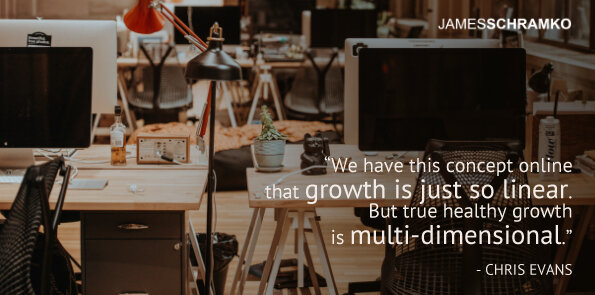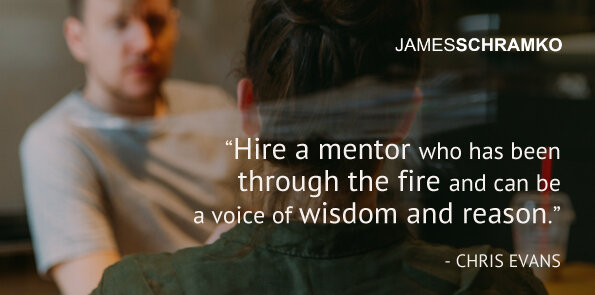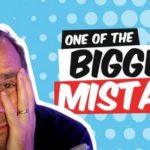Podcast: Download (Duration: 42:27 — 39.6MB)
Get Notified Of Future Episodes Apple Podcasts | Spotify | Amazon Music | Android | Blubrry | Gaana | TuneIn | Deezer | Anghami | RSS | More
Chris Evans’s company became a runaway success almost overnight. It was exciting times; what he didn’t foresee, though, was the entrepreneur burnout that would follow.
In this podcast appearance, Chris talks with James about the experience of running a high growth business.
He shares how he came to change mindset about what he wanted and redefine success.
And our two experts discuss how you can build a successful business without losing sight of true happiness.
Table of contents:
1. A big business built quickly
2. Scaling up, then down
3. After the six-figure month
4. When you’re not good at it…
5. Unbridled growth
6. Bigger revenue, bigger responsibility
7. A changing concept of success
8. Did you know you can design your life?
9. The process of deciding what you want
10. The results of stepping down
11. Changing the alter ego
12. How being a parent impacts business
13. Advice to those in growth phase
14. Backing off from the business
15. What could be an important episode
A big business built quickly
January of 2016 was when Chris and his partner Taylor went full-time into their business, Traffic and Funnels. Chris was on the ad side, building webinars and launch infrastructure; Taylor did sales.
In their first month, they made six figures. And for Chris, that was an amazing amount of money, an arrival of sorts after years of grinding.
Scaling up, then down
James achieved something similar in 2008 – the first month after quitting his job, he did six figures. And he’s never averaged less than six figures monthly since.
He did go into service provision at one point, website and SEO, scaling up to a team of 65 at a 50 percent profit margin. He eventually sold off the service agencies, however, and is down to a tiny team of six, making seven figures yearly and great profit.
James has a share too in his wife’s recruitment agency, visionfind.com, a good little business as well.
After the six-figure month
So what happened to Chris after the six-figure month?
They made their first hire, a media buyer, followed by an ops person. They also launched a newsletter, which Chris thinks really got them attention.
Traffic and Funnels was all over the place – people knew them. And that’s when they thought it was only right to add people and scale as much and as fast as they could.
They added info products, front end products, self-liquidating offers, and became popular in their industry. It put them ahead of the curve and built market share quickly.
When you’re not good at it…
It makes sense, says James, that they would smash the traffic and funnels part. But what weren’t they good at? What broke?
The biggest challenge, Chris thinks, was operations and finance. Neither he nor his partner liked or was particularly good at it.
So hiring their ops guy in 2018 was another catalyst for their growth. It let Chris stay in innovation and marketing while Taylor handled sales.
With all that working, says Chris, they could go to the moon.
Unbridled growth
The mistake they made was being ungoverned. They could grow, and grow fast, so they did, without an identity or value system that would bring boundaries to the organization.
If Chris could go back, he would want that – discipline in growth.
People come to James with big growth goals, and some of them actually want to work more than less, to which James acknowledges different people have different goals.
But if you’re young, he says, and full of fire, he would question what’s driving it. Why make $10 million a year?
Bigger revenue, bigger responsibility
If you’re a seven-figure business, when you get to $10 million dollars a year, does it change for you?
All you get is more responsibility, says Chris.
That’s what James experienced, and it really hit him when he hired out a whole restaurant in the Philippines to accommodate his team of 60.
He’d like to call out the listeners, especially guys in their 30s or mid 20s, who think $10 million a year will make them significant or valuable. He’s helped people in this age range grow, like Ezra Firestone, and he knows that drive needs to be managed – otherwise, there’s no knowing where North is anymore.
A changing concept of success
So after adding Western team members, after getting offices and building a significant thing, with all the money going in and out, did Chris start to rethink success?
The velocity had gotten pretty crazy, said Chris, when he realized the responsibility he had. He woke up thinking, he’d built a prison for himself that was very hard to escape.
On top of Traffic and Funnels, they had something called Sales Mentor, which also blew up. And they had a real estate company, and a book publishing business.
And like James was talking about, the expansion came largely out of wanting significance, and acceptance, and the praise of people. For Chris too, there was a desire for financial security – and this was all, he thought, an unhealthy foundation for scaling.
It was ultimately something he and his partner didn’t want, and led to this year stepping out of the business and handing it off to someone else.
And Chris is taking time to redefine success and figure out what he wants, to design business and life from a healthy identity. A lot of it is about pace, being okay with slow, methodical and intentional, because his whole life he’s been in a hurry.
Did you know you can design your life?
We’ve been taught all these myths about success, says James, and really the key point is to design your life. He suspects people have not yet realized they can do that.
We’re force fed the script of school, good grades, and university, so we can become a doctor or engineer or something similarly valued and make good money.
You get a nice house with a mortgage, get married, have kids, and at 65 stop working and live off your retirement fund.
It’s not how it works, says James, and people in the online space have realized that.
In James’s world, you can create your own calendar, work with the people you want, build your own team – it’s exciting and interesting. And it’s not from a place of lack but of abundance, calm and serenity.
The process of deciding what you want
What was Chris’s process for resetting the compass, and getting to where he wanted?
Chris took a sabbatical, to get, in his words, quiet and solitude and space and capacity to be confronted with the condition of his soul.
Then in that space and stillness and solitude it was looking at identity: who was he as a person and who did he want to become, that would have longevity?
Chris thinks longevity in business really is the thing that creates multi-dimensional growth. We have this concept online that growth is linear, but true healthy growth is multi-dimensional, and roots into the ground.
We think expansion is just about business. But what if in the capacity of the business, Chris could spend time with his daughter? And what if we had a value system in which that was important?
This is the message Chris hopes to bring to the industry – one of multi-dimensional growth and deep roots and the right foundation.
The results of stepping down
It gets heavy, doesn’t it, asks James?
It does, says Chris, which is why he hired a mindset coach to help him work through things – one of the best things he’s ever done.
The change has made Chris, he says, a better husband and father, and more powerful; he knows what he wants and needs. And to design that for himself and his family has gotten him to the point where he would not want to step back into what he had.
He’s had amazing experiences, and beautiful messages from people who have changed their own lives. But there was also grieving – he’d had no idea how much his identity was tied up with needing to be someone of significance.
Changing the alter ego
Did Chris have to change his alter ego, as Todd Herman talks about?
It’s an interesting question, says Chris. He’s had to deconstruct, and is in the process of reconstructing everything.
He looks at the core of why he does or doesn’t do things, to some degree, in the context of his kids. He spent formative years so busy building businesses, and now being around as a dad has been a very important piece for him.
If you don’t have peace and contentment, he says, if you’re walking around with anxiety or a short fuse, paying attention to your phone versus your kid talking to you, that sends messages. It encodes things into your kids, and that’s a state Chris doesn’t want to be in.
He wants to be in a state of being fully present and available in every way, with his eye contact and emotions and physical touch. He would highly encourage entrepreneurs to check into, what’s your state that you carry in the house, in the family?
It’s something Chris is looking at prioritizing, and being intentional about. And he thinks it’s something not talked about enough.
How being a parent impacts business
Not talked about much at all, says James.
It’s very easy to build a $100 million business if you and your partner just work seven days a week, and that’s all you do. But for anyone listening to this podcast, as a parent, kids change the game completely.
James has learned the most from his kids. Kids are the best teachers, they teach you everything about how humans operate.
They can motivate you to do things you wouldn’t do for anybody else. And the bond and connection you can experience when you’re close to your kids is hard to put into words.
It’s a lot like trying to explain surfing to a non-surfer.
Advice to those in growth phase
What would be Chris’s tip to someone who’s currently in a growth phase of their business?
Chris would say to hire a mentor who has been through the fire and can be a voice of wisdom and reason. Chris is looking to be that now for people on the journey.
He wishes he’d had a James Schramko – someone to pull him back and ask, why am you doing that? Really, why am you doing that? Is that really what you want?
At the very least, he could have used someone to help him establish some kind of governor or boundaries. Because when you’re going fast and building off ego and the like, it’s building off a false self.
You wake up one day, and it’s not what you thought or wanted. And to avoid that, you need boundaries.
Backing off from the business
How did Chris step away? Did he just say, it’s all yours, I’m done? Or did he consider sell off some of the business, or getting someone to buy in a stake? Or did he just give the team a time period for rolling down?
It was initially a 30-day sabbatical, says Chris, for him to just collect his thoughts. After a month, however, he realized he was not ready to do anything – he had a lot to work through, to process.
At that point, he told the team he’d be there for advisement or counsel, but he wasn’t coming back. They brought in someone new to lead, who had equity in the business.
It then came to a point where, with the momentum or lack of momentum in the business, it seemed the best thing to do was a wind-down, or getting rid of certain parts, and keeping maybe a few elements.
That’s the state the business is in now. Chris is not involved in it. And it could have turned out better, he says, had they had wisdom and the proper nuances, so he’s had regrets.
James likes the viewpoint that things happen for you, not to you. He doesn’t think Chris would be as useful to people now on this topic, unless he’d been through it firsthand.
Every single negative has a positive attached to it, if you could recognize it, and bring it forward. When Chris is helping people a year from now, he’ll recognize where certain situations are going and when to head them off.
What could be an important episode
Chris is in a pretty privileged situation in life, as it turns out, says James. So take some good with the bad.
Life is what it is, but from today onwards, Chris, James, anyone who’s listening to or watching this podcast, can make choices to put their future self in a better position. Maybe some of the points from this episode will hit home with some.
James really feels this episode is important for someone who’s on a growth tear right now, and hasn’t really stopped to think about why.
Chris is brave to share his story. If you want more of his perspective, check out his podcast at chrisaevans.com/podcast. And we may have Chris back in the future to continue his narrative.
Enjoyed the show? Leave us a review on iTunes













Leave a Reply